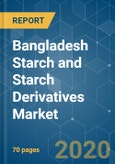The market is primarily driven by the growing textile and food and beverage industries in the country. With the growth in the textile industry, the application of tapioca and maize starch is also expected to rise in the industry. Additionally, the growing use of starch and starch derivatives, in the country, is fuelling the demand for modified starch in Bangladesh.
The demand for modified starch is increasing in parallel to the rapid development of the food industry. Modified starch offers several functional benefits to a variety of food, such as bakeries, snacks, beverages, and nutritional foods.
Key Market Trends
Food and Beverage is the Fastest Growing Segment
The food processing sector in Bangladesh comprises fruits and vegetables, cereals, bakery and confectionary, pulses, oilseeds, dairy, carbonated beverages, fruit juices, and other food items. There is a significant increase in the demand for all forms of ready-to-eat or convenience food and beverage products, owing to the increasingly busy lifestyles and the rising working population in Bangladesh. The food processing industry is expected to have significant growth and generate new opportunities for investment and exports for the country.
The use of modified starch, as a stabilizer, thickening agent, and emulsifier, in manufacturing, bakery, confectionery, noodles, and other convenience food products is fuelling the demand for starch among food and beverage manufacturers in the country. According to the food consumption survey conducted by the Food and Agriculture Organization of the United Nations (FAO) in Bangladesh, in 2018, young children in the country are provided with starchy food prepared with sago, semolina, rice, and noodles.
Textile Industry Holds the Dominant Share
Developing countries, like Bangladesh, are dependent on their textile industries. The textile industry forms the second-largest industry in Bangladesh, after agriculture, as it generates 75% of the employment in the country. The majority of the garment workforce includes female workers. Bangladesh is highly dependent on textiles and clothing for merchandise exports (83.5%). The consumption of starch has also increased for the printing and finishing of manufactured garments.
Tapioca starch is used in the treatment of yarn before weaving, as a result of which, the production of tapioca increased, in recent years, in Bangladesh. The production of cornstarch has increased massively, in the country, due to its multiple functions, such as for thickening and as an adhesive. These properties of starch make it an essential ingredient in the textile industry. Thus, the growth of starch and its derivatives is in parallel to the textile production in the country.
Competitive Landscape
Bangladesh is a low income, developing, and import-dependent country. The starch and starch derivatives are imported from India, Vietnam, Thailand, Pakistan, Germany, and other few countries. The key global players in the market include Cargill Inc., KMC, and Gulshan Polyols Pvt. Ltd. While local prominent players in the market include Maize Advanced Agro Refinery, Bangladesh Maize Products Limited, and Flamingo Agro Tech Limited (FATL).
Reasons to Purchase this report:
- The market estimate (ME) sheet in Excel format
- 3 months of analyst support
This product will be delivered within 2 business days.
Table of Contents
Companies Mentioned (Partial List)
A selection of companies mentioned in this report includes, but is not limited to:
- Cargill Inc.
- Gulshan Polyols Limited
- KMC
- JTA Group
- FLAMINGO AGRO-TECH LTD
- Biswas Agro
- Maize Advanced Agro Refinery
- Paperex BD
- Bangladesh Maize Products Limited








